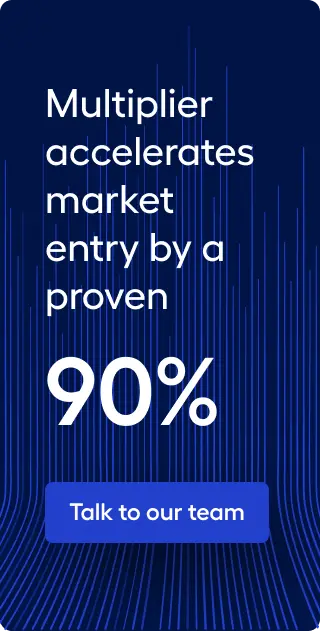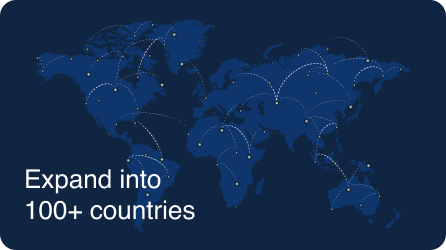Having a global business calls for a diverse team with an inclusive culture where your staff feels valued, heard, and supported. This is because approximately 65% of people across different identity groups felt that an inclusive environment is important when applying for new roles.
A research by Bain & Company states that enabling diverse talent allows employees to thrive, progress, and fully contribute toward business requirements. This has, in turn, helped businesses with employee retention.
However, recruiting diverse employees across regions is just the beginning of a challenging process. A diverse recruitment process carries several compliance aspects of hiring in a new region and setting relevant company policies. This is especially true for small and medium businesses tapping into a larger talent pool.
To help you get started, this article ensures you have all the relevant details about diversity recruiting and all the necessary strategies.
What is diversity recruiting?
Diversity recruiting is the process of actively seeking out candidates from different backgrounds in a more inclusive manner. This process ensures that you are hiring, recruiting, and promoting fair and equitable processes by removing the effects of unconscious biases and barriers.
Therefore, diversity recruiting involves fairly hiring and sourcing employees from different
- Genders
- Religions
- Class backgrounds
- Intellectual and physical abilities
- Nationalities
- Social standings
Why is workforce diversity important?
While there are more job openings than people looking for work, businesses across the globe have been facing a tight labor market for almost five decades. This could be because of a few reasons explained through the statistics below:
- 76% of job seekers and employees feel diversity is essential when considering job offers.
- A survey conducted by the Workplace Job Seeker concluded that 87% of the participants indicated that the leaders believe diversity recruiting is important.
- And lastly, businesses that welcome a diverse workforce are 1.7x more innovative, because of which about 81% of employers have a strong diversity recruiting strategy.
These statistics indicate that diversity and inclusion in the workplace are crucial to acknowledge and valuing each employee’s strengths and potential. In the longer run, a diverse culture
- Creates fair work culture and a thriving workplace by valuing the differences that each employee brings in.
- Creates a sense of inclusion amongst employees of all backgrounds
- Offers equal opportunities to their workforce
Additionally, a diverse workplace also contributes toward improved cultural awareness and increased productivity. This is especially true for employers with a multigenerational workforce where individuals with different age groups work for the same employer. In such cases, candidates seek businesses that commit to diversity initiatives.
Therefore, it is important that employers offer diversity in the workplace as it offers a sense of inclusion and acceptance of employees of all backgrounds.
Although driving workplace diversity can be challenging, a recruitment strategy ensures that diversity recruitment is made easy by outlining measurable actions. Businesses prioritizing diversity and inclusivity have better employee retention and are likely to be seen as innovators. This is where a diverse recruiting strategy comes into play.
What is a diversity recruitment strategy?
A diversity recruitment strategy outlines goals, action items, and accountabilities to attract, assess, and hire job candidates with diverse backgrounds to drive business success. Businesses develop a diverse recruitment strategy to ensure that their workforce reflects
- A diverse range of experiences, backgrounds, genders, and perspectives
- Regions where your employees operate from (different areas that employees work from include the Asia Pacific, Europe, Middle East, and Africa)
- Your company’s customer base
Diverse recruitment strategies constantly evolve, just like businesses, to ensure there is growth in job satisfaction and workforce diversity, business results and innovation, community impact, and the company culture.
How does a diversity recruitment strategy help?
A strong diversity recruitment strategy aims at:
- Creating a basis for greater accountability, equity, and integrity among the leaders and the workforce. With a good diversity recruitment strategy, the management can create a good work culture and ensure the workforce feels motivated and accountable towards their job.
- Accessing large and varied candidate pools across different geographical regions. A strong diversity recruitment strategy helps employers to access potential candidates from diverse backgrounds and across different locations.
- Increasing cultural and linguistic awareness amongst the management and the existing workforce. A well-planned diversity recruitment strategy will help employers hire candidates from diverse backgrounds. Employees from different backgrounds help increase cultural and linguistic awareness in the workforce.
- Helping employers access a broader range of work experience and varying skill sets on your team. A diversity recruitment strategy helps employers make better hiring decisions as a good strategy attracts suitable candidates and ensures the right candidates apply for relevant positions
Additionally, an employer must create a strong diversity recruitment strategy to ensure that their employees feel comfortable in their workspace. This contributes toward creating inclusivity and belonging amongst their leadership and workforce.
The next section aims at guiding you through several diversity recruitment strategies that can help you choose the one that fits your long-term hiring goals.
Diversity recruitment strategies
- A diversity recruitment strategy must constantly evolve as the business grows, the employee base increases, and new information becomes available.
- Once you finalize a strategy that suits your business the best, you can address the diversity of candidates as part of your recruitment policies.
- However, it is important that you periodically monitor the progress of your initiatives and make necessary adjustments when required.
Below are a few diversity recruiting strategies that should evolve and change to meet your business requirements as well as your employee base:
Increasing talent searches in your current recruiting program
When hiring and sourcing candidates for a job role, businesses can find top talent representing different backgrounds and identities on major recruiting websites in a particular area. Examples of major recruiting websites when sourcing for candidates in India can include naukri.com, LinkedIn, etc.
Ideally, there would be competition with global employers accessing the same diverse talent pool and searching the same recruiting platforms. Maximizing your search on such job boards is essential to ensure you can tap into the top talent pool.
Looking for users and candidates who identify with a specific diversity-oriented group or belong to different diverse organizations is key. For example, you can search and source alums of diverse fraternities, historically black colleges, or universities (HBCUs).
Nurturing your pipeline of diverse candidates
An effective hiring process promotes streamlining and nurturing diverse candidates. The database of job candidates collected during the recruiting process is an untapped pool of candidates you can re-engage via your recruiting funnel.
You can re-engage and nurture your recruiting funnel by:
- Segmenting and differentiating high-potential candidates and building communications highlighting advancement and growth opportunities.
- Reaching out to those candidates who have previously made it to the final stages of interview rounds, especially with relatively newer positions.
- Ensuring you leverage recruitment marketing channels by promoting your employer brand helps you spread awareness amongst your potential talent pool.
Leveraging specialized job boards
Although your primary means of sourcing diverse candidates would be to rely on the most popular recruitment boards, it is also important to note that several smaller job boards have seen significant growth in the number of job seekers. Job boards have also been specifically designed to connect diverse candidates with employers.
A few noteworthy examples of specialized job boards include:
- AbilityLinks
- 70 Million Jobs
- Inroads
- Female Executive Search
- Out & Equal
Re-evaluating your current interviewing practices
Interviewing is one of the critical steps of a diversity recruiting process, but it can get biased. Although you may have a formalized and robust interview process, it is still critical to revisit your interview processes periodically to ensure that it is still effective and make necessary changes, if required.
A few questions would help evaluate your interview practices:
- Are your current interviewers aware of the different types of biases?
- Educating your hiring and recruiting team by hosting workshops helps mitigate possible biases during the interviewing process.
- Do your interviewers belong to diverse backgrounds?
- To recruit and hire diverse candidates, it is important to ensure you have a panel of interviewers from diverse backgrounds.
- Are your current interview questions structured in a way that mitigates biases?
- Standardizing the interview process ensures no inconsistencies in the selection, and candidates are evaluated on the same set of criteria.
Diversity hiring best practices
Diversity recruitment in today’s day and age is a necessary process; however, recruitment as a process alone isn’t enough to compete with other businesses looking for top talent. Below are a few ways that go beyond recruiting that help to attract diverse candidates:
- Offering equitable perks and benefits: Along with standard benefits that you offer your employees, it is a good practice to provide additional benefits (commonly known as fringe benefits). Offering benefits, equal parental leaves for employees of all genders, or flexible work policies can help attract top talent.
- Highlighting diversity in the job descriptions: With a generic “equal opportunity employer” statement will be a great way to elaborate on what your company culture is all about in your job descriptions. Additionally, you can also dedicate a paragraph to describe your DEI initiatives.
- Offering education and learning programs: Making learning and education programs more accessible to deserving employees make a difference. This can be done by implementing a comprehensive education program within your organization, such as offering the advantage of earning certifications, credentials, and/or degrees while growing within your organization.
- Creating an employer brand rooted in inclusion, diversity, and equity: Making DEI one of your organization’s top priorities shows that diversity and inclusion are key to your company values.
Break the diversity recruiting barriers with Multiplier
A diverse recruitment process in today’s time is one of the most sought-after qualities a candidate looks for in an organization. Due to this, diversity recruiting can be a challenging process, especially if you are looking to hire talent from multiple regions.
In addition to diversity recruiting, offering the right benefits package, ensuring you pay payroll taxes on time, and providing salaries in different currencies are crucial. It may require you to set up entities where your global team is. You can now partner with Multiplier to ensure all of these complexities are handled while you focus on creating a diverse workforce.


